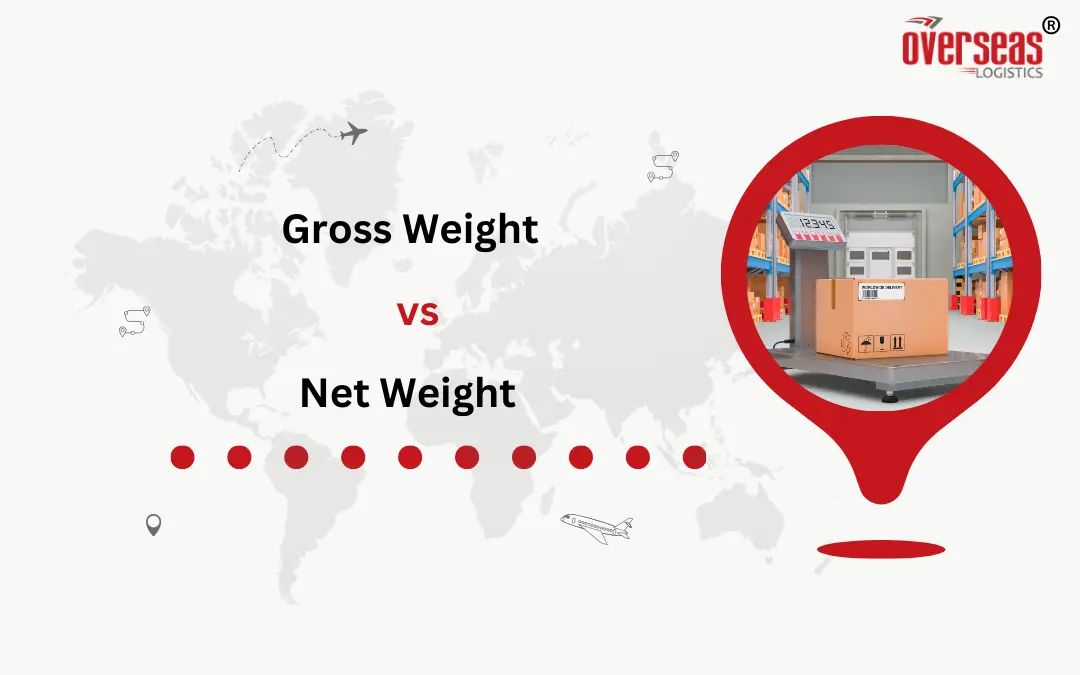Air freight services rely heavily on precise weight measurements to ensure efficient transportation and adherence to safety regulations. Among the key concepts involved in this process are gross weight and net weight. Understanding the distinction between these two terms is crucial for both shippers and carriers to facilitate smooth operations and avoid potential complications.
Understanding Gross Weight
Definition
Gross weight refers to the total weight of a shipment, including all items contained within the package or cargo. This encompasses not only the goods being transported but also the weight of packaging materials, pallets, crates, and any other accessories used for containment and protection.
Components Included
In air freight services, the gross weight comprises the combined weight of the actual cargo and the packaging materials utilized to secure and safeguard the goods during transit. This figure is essential for determining the overall load that an aircraft can safely carry and ensuring compliance with weight restrictions set by aviation authorities.
Importance in Air freight services
Gross weight serves as a fundamental metric in air freight operations, influencing various aspects such as pricing, loading capacity, and aircraft performance. Airlines and freight forwarders rely on accurate gross weight measurements to allocate space efficiently and distribute loads evenly across aircraft.
Understanding Net Weight
Definition
Net weight, on the other hand, refers specifically to the weight of the goods or merchandise being shipped, excluding the weight of any packaging materials or containers. It represents the actual mass of the product itself, devoid of any external factors.
Components Included
In air freight terminology, net weight encompasses solely the weight of the cargo or merchandise without accounting for the weight of packaging materials, pallets, or other enclosures. It provides a precise measure of the product’s mass, which is essential for inventory management and customs declarations.
Importance in Air Freight Services
Net weight holds significant importance for both shippers and recipients in air freight transactions. It determines the actual quantity of goods being transported and serves as a basis for calculating international courier/shipping costs, customs duties, and taxes. Accurate net weight measurements are essential for invoicing purposes and for ensuring transparency in commercial transactions.
Key Differences between Gross Weight and Net Weight
In air freight services, the differentiation between gross weight and net weight lies in their definitions and calculations.
Definition and Calculation
- Gross weight includes the total weight of the shipment, encompassing both the cargo and packaging materials.
- Net weight represents only the weight of the goods themselves, excluding any packaging or containers.
Inclusions and Exclusions
- Gross weight accounts for all components of the shipment, including packaging, pallets, and other accessories.
- Net weight focuses solely on the mass of the goods, disregarding the weight of packaging materials.
Importance of Accurate Weight Measurements in Air Freight
For several reasons, ensuring precision in weight measurements is paramount in air freight operations.
Safety Regulations
- Aviation authorities enforce strict weight limits to maintain aircraft stability and prevent overloading.
- Accurate weight measurements mitigate the risk of accidents and ensure compliance with safety standards.
Cost Considerations
- Freight charges are often calculated based on the gross weight of the shipment.
- Inaccurate weight assessments can lead to discrepancies in billing and potential disputes between shippers and carriers.
Factors Influencing Gross and Net Weights in Air Freight
Various factors can influence the determination of gross and net weights in air freight.
Packaging Materials
- The choice of packaging materials impacts the overall weight of the shipment.
- Lightweight packaging options can help reduce the gross weight without compromising product protection.
Handling Processes
- Improper handling during loading and unloading can affect the accuracy of weight measurements.
- Utilizing efficient handling equipment and procedures minimizes the risk of errors.
Documentation Accuracy
- Complete and precise documentation is essential for recording accurate weight measurements.
- Proper labeling and declaration of contents facilitate smooth customs clearance processes.
Impact of Gross and Net Weight Discrepancies
Discrepancies between gross and net weights can have significant repercussions in air freight operations.
Shipping Delays
- Incorrect weight measurements may result in delays during cargo acceptance and processing.
- Reconciliation of discrepancies consumes valuable time and resources, leading to delivery delays.
Additional Costs
- Carriers may impose surcharges or penalties for discrepancies between declared and actual weights.
- Shippers may incur additional expenses for reweighing and adjusting shipments to meet regulatory requirements.
Strategies for Maintaining Accurate Weight Measurements
To mitigate the risk of weight discrepancies, stakeholders in air freight can implement several strategies.
Proper Packaging Techniques
- Employing lightweight yet durable packaging materials minimizes excess weight.
- Ensuring secure packaging prevents damage and loss during transit.
Utilization of Weighing systems
- Investing in accurate weighing equipment enhances the precision of weight measurements.
- Automated systems streamline the weighing process and reduce the likelihood of errors.
Documentation Review
- Conducting thorough reviews of shipping documents helps identify inconsistencies in weight declarations.
- Collaborating closely with freight forwarders and carriers ensures alignment in weight reporting.
Conclusion
In conclusion, understanding the distinction between gross weight and net weight is essential for effective management of air freight shipments. Accurate weight measurements are critical in ensuring safety, compliance, and cost-efficiency in aviation logistics. By adhering to best practices and utilizing advanced weighing technologies, stakeholders can optimize their operations and minimize the impact of weight discrepancies.
FAQs
What is the significance of gross weight in air freight?
Gross weight determines the total load carried by an aircraft, including both cargo and packaging materials, influencing factors such as pricing and loading capacity.
How does net weight differ from gross weight?
Net weight refers specifically to the weight of the goods being transported, excluding the weight of packaging materials, pallets, or containers.
Why is accurate weight measurement important in air freight services?
Accurate weight measurements ensure compliance with safety regulations, facilitate fair pricing and prevent disputes between shippers and carriers.
What factors can contribute to discrepancies between gross and net weights?
Factors such as improper packaging, handling errors, and incomplete documentation can lead to discrepancies between gross and net weights.
What strategies can be employed to maintain accurate weight measurements in air freight?
Utilizing lightweight packaging materials, investing in reliable weighing systems, and conducting thorough documentation reviews are key strategies for maintaining accuracy in weight measurements.

